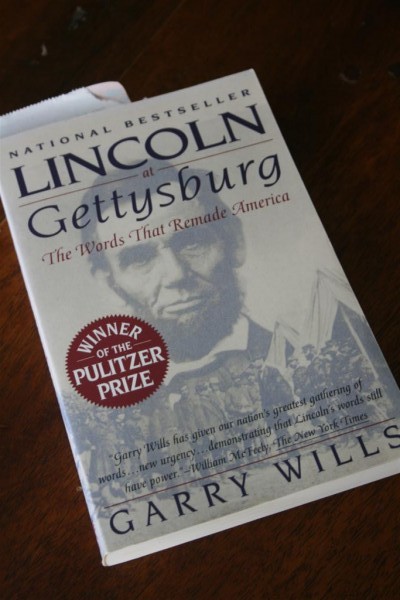Lincoln at Gettysburg by Garry Wills

After finishing Team of Rivals I still wanted to read more about Abraham Lincoln. Lincoln at Gettysburg was next on my list. This book was tiny in comparison, around 200 pages.
I learned some really interesting things from this book. First Wills traces the Greek Revival going on in the U.S. during Lincoln’s day and evaluates how well the Gettysburg Address follows patterns of funeral oratory used by the ancient Greeks. The cemetery at Gettysburg also was representative of an affinity for Greek style at that time. For the first time in my life I read the other speech given at Gettysburg, the two hour one given by Edward Everett. He was the star of the show that day; Lincoln’s comments were meant only as a “few appropriate remarks.”
Yet those remarks have changed forever the way Americans view the founding and mission of our nation. 272 words.
Lincoln’s writing and speaking style have interested me for a long time. Indeed, I agree with those who say that his are the only writings of all the U.S. Presidents that can rightly be called literature. My reading in recent months has given me an appreciation for the way Lincoln’s ideas crystallized as he wrote and spoke over the course of 15 years, each time refining his ideas until he reached those crowning moments such as the Gettysburg Address and his second Inaugural Address. It is thrilling to watch the development of such brilliance.
Hugh Blair wrote, “The first rule which I shall give for promoting the strength of a sentence is to prune it of all redundant words…. The exact import of precision may be drawn from the etymology of the words. It comes from precidere , to cut off. It imports retrenching all superfluities and turning the expression so as to exhibit neither more nor less than an exact copy of his ideas who uses it.”
I am painfully aware of my tendency to use too many words both in writing and speech. It is a habit I am always working on. Perhaps this weakness makes Lincoln’s mastery of “pruning” a sentence of all redundant words more amazing to me. His ability to take suggestions, read the speeches and writings of others, then condense all of it in a compact and powerful sentence was amazing.
Quoting the author, “Lincoln’s speech at Gettysburg worked several revolutions, beginning with one in literary style. Everett’s talk was given at the last point in history when such a performance could be appreciated without reservation. It was made obsolete within a half-hour of the time when it was spoken. Lincoln’s remarks anticipated the shift to vernacular rhythms that Mark Twain would complete twenty years later. Hemingway claimed that all modern American novels are the offspring of Huckleberry Finn . It is no greater exaggeration to say that all modern prose descends from the Gettysburg Address.” (Lincoln at Gettysburg, p. 148.)
It was also Abraham Lincoln who shifted America’s view of the Declaration of Independence to include the lofty ideal of holding out a promise of equality to all mankind. It was Lincoln who shifted America’s view to make the Declaration of Independence our founding document (instead of the Constitution). Even today, we perceive nation differently because of the way Lincoln traced the majority of his political thought to the Declaration of Independence.
In sum, my heart thrills at the writings of Lincoln and my appreciation for them has been enhanced by the scholarship of Garry Wills in writing this book. I highly recommend it.
